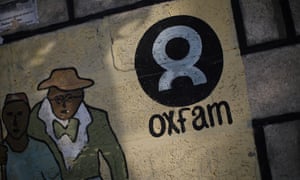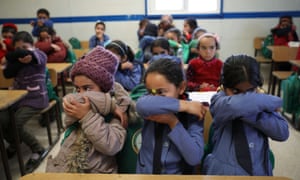'The issue now is surviving': countries react with shock to Oxfam withdrawal
Locals, NGOs and politicians express fears for world’s most vulnerable as charity announces withdrawal from 18 countries due to financial impact of Covid-19
Kaamil Ahmed, Karen McVeigh, Joe Parkin Daniels and William Costa
Thu 21 May 2020 THE GUARDIAN

An Oxfam sign is seen on a wall in Corail, a camp for displaced people of the earthquake of 2010, on the outskirts of Port-au-Prince, Haiti. Photograph: Andrés Martínez Casares/Reuters
Oxfam International’s announcement that it will close operations in countries including Afghanistan and Haiti has prompted fears that regions are being abandoned just as the coronavirus pandemic makes them more vulnerable.
Oxfam said the impact of Covid-19 on its finances had forced it to fast-track a global restructuring programme, which entails the closure of 18 country offices.
The NGO was already trying to deal with a drop in public donations after the Haiti sex abuse scandal in 2018. Oxfam’s finances have been further hit by having to close its shops as a result of coronavirus restrictions, losing it £5m every month.
Civil society groups and social workers are concerned the dramatic changes might signal a scaling-back of the role NGOs play in providing vital services.

Oxfam to close in 18 countries and cut 1,500 staff amid coronavirus pressures
Social worker Modaser Islami said the closure of Oxfam’s Afghanistan office, which opened in 1961, will leave big gaps in aid provision, especially in rural areas.
“The issue right now is not about improving our situation, it’s about surviving. There are more and more people coming on to the streets asking for help and without it, they say they wouldn’t be able to eat,” said Islami.
He fears the Afghan government is not in a strong enough position to support the country’s poorest if aid groups begin leaving and foreign governments do not help plug the gap.
“It’s most worrying because the type of work Oxfam has been doing improved livelihoods in rural areas where most others don’t reach, both aid groups and governments,” he said. “They have no other sources of incomes, just a little land, and face challenges getting healthcare, also education.”
Oxfam closures will affect offices in Asia, Africa and Latin America and the Caribbean, and result in the loss of 1,450 programme staff.
Pedro Vega, a member of a farmers’ association in Paraguay that received support from Oxfam, said the NGO’s withdrawal was a great loss.
“Oxfam helped our association to make a very important leap forward,” he said. “It showed that if NGOs’ projects are well implemented, they can create change, help construct a different way of living in the countryside and get our produce the real value that it deserves.”
Oxfam has been in Paraguay for 28 years and worked collaboratively with more than 60 local organisations on projects including those promoting women’s rights and sustainable development.
In a statement, Óscar López, head of Oxfam Paraguay, said: “We hope that our contribution to strengthening civil society will continue to bear fruit.”
Carlos Mejia, the executive director of Oxfam in Colombia, said: “The decision to leave countries was anything but easy, it was a painful decision.”
Insiders say Oxfam’s restructuring is expected to impact other parts of the charity in the coming weeks, including at its Oxford headquarters in the UK.
An Oxfam GB spokesperson said that aside from the announcements made by the international charity, its largest national affiliate will now have to reduce its expenditure and review plans made before the pandemic.
Sarah Champion, chairwoman of the House of Commons international development committee, said the announcement will “further concern struggling communities who rely on the assistance of aid organisations”.
Champion, the Labour MP for Rotherham, whose committee is examining the impact of the pandemic on developing countries, said the loss of income for NGOs was already having a chilling effect on their work.
“We have received evidence that NGO charities are suffering huge losses of income due to lockdown and as donor governments, businesses and individuals all feel their own economic and financial challenges. This is already starting to have a chilling effect on the humanitarian and development capacity of UK NGOs and their crucial work abroad.”
Stephanie Draper, the CEO of Bond, the international development network, said: “It’s really sad to see such a big name not being able to respond to the real need in countries around the world.”
The challenges of the coronavirus presented a “bleak picture for our members right now”, Draper added
Oxfam International’s announcement that it will close operations in countries including Afghanistan and Haiti has prompted fears that regions are being abandoned just as the coronavirus pandemic makes them more vulnerable.
Oxfam said the impact of Covid-19 on its finances had forced it to fast-track a global restructuring programme, which entails the closure of 18 country offices.
The NGO was already trying to deal with a drop in public donations after the Haiti sex abuse scandal in 2018. Oxfam’s finances have been further hit by having to close its shops as a result of coronavirus restrictions, losing it £5m every month.
Civil society groups and social workers are concerned the dramatic changes might signal a scaling-back of the role NGOs play in providing vital services.

Oxfam to close in 18 countries and cut 1,500 staff amid coronavirus pressures
Social worker Modaser Islami said the closure of Oxfam’s Afghanistan office, which opened in 1961, will leave big gaps in aid provision, especially in rural areas.
“The issue right now is not about improving our situation, it’s about surviving. There are more and more people coming on to the streets asking for help and without it, they say they wouldn’t be able to eat,” said Islami.
He fears the Afghan government is not in a strong enough position to support the country’s poorest if aid groups begin leaving and foreign governments do not help plug the gap.
“It’s most worrying because the type of work Oxfam has been doing improved livelihoods in rural areas where most others don’t reach, both aid groups and governments,” he said. “They have no other sources of incomes, just a little land, and face challenges getting healthcare, also education.”
Oxfam closures will affect offices in Asia, Africa and Latin America and the Caribbean, and result in the loss of 1,450 programme staff.
Pedro Vega, a member of a farmers’ association in Paraguay that received support from Oxfam, said the NGO’s withdrawal was a great loss.
“Oxfam helped our association to make a very important leap forward,” he said. “It showed that if NGOs’ projects are well implemented, they can create change, help construct a different way of living in the countryside and get our produce the real value that it deserves.”
Oxfam has been in Paraguay for 28 years and worked collaboratively with more than 60 local organisations on projects including those promoting women’s rights and sustainable development.
In a statement, Óscar López, head of Oxfam Paraguay, said: “We hope that our contribution to strengthening civil society will continue to bear fruit.”
Carlos Mejia, the executive director of Oxfam in Colombia, said: “The decision to leave countries was anything but easy, it was a painful decision.”
Insiders say Oxfam’s restructuring is expected to impact other parts of the charity in the coming weeks, including at its Oxford headquarters in the UK.
An Oxfam GB spokesperson said that aside from the announcements made by the international charity, its largest national affiliate will now have to reduce its expenditure and review plans made before the pandemic.
Sarah Champion, chairwoman of the House of Commons international development committee, said the announcement will “further concern struggling communities who rely on the assistance of aid organisations”.
Champion, the Labour MP for Rotherham, whose committee is examining the impact of the pandemic on developing countries, said the loss of income for NGOs was already having a chilling effect on their work.
“We have received evidence that NGO charities are suffering huge losses of income due to lockdown and as donor governments, businesses and individuals all feel their own economic and financial challenges. This is already starting to have a chilling effect on the humanitarian and development capacity of UK NGOs and their crucial work abroad.”
Stephanie Draper, the CEO of Bond, the international development network, said: “It’s really sad to see such a big name not being able to respond to the real need in countries around the world.”
The challenges of the coronavirus presented a “bleak picture for our members right now”, Draper added

Syrian refugee students take part in an awareness campaign about coronavirus initiated by Oxfam and Unicef at Zaatari refugee camp in Jordan. Photograph: Muhammad Hamed/Reuters
Kevin Watkins, the chief executive of Save the Children, said: “Oxfam is a brilliant organisation that does desperately needed work across all of these countries. I’m very sad that, because of the financial situation they are in, they have had to make these decisions. All of us are saddened by it.”
Save the Children does not have any plans to cut programmes, he said.
Among the closures will be Oxfam’s office in Haiti, a country that has had a complicated relationship with international charities. It has yet to respond publicly to the planned closure.
Locals have relied heavily on NGOs for care and support, which at times have supplanted government assistance.
When the 2010 earthquake turned much of the country’s capital Port-au-Prince to rubble, around 10,000 aid organisations assisted with the recovery.
“Usually when there’s a crisis everyone comes to help, but this time [during the coronavirus] the airport is closed and no one is coming,” said Laure Bottinelli, the founder of Anacaona Community, a soap recycling social business based in Port-au-Prince. “Instead, international organisations are leaving, and taking a bunch of jobs with them. This has never happened.”
In Jacmel, a city on the southern coast of Haiti, international NGOs have distorted the workforce, something that will be felt when they leave.
“People working for INGOs pay good money for their cars, homes, and other services, but now without employment, they won’t be able to keep it going,” said Huguens Saintil, who works with a small foundation in Jacmel. “Locals had the feeling that foreigners are the solution to their problems instead of fighting to resolve them.”
No comments:
Post a Comment